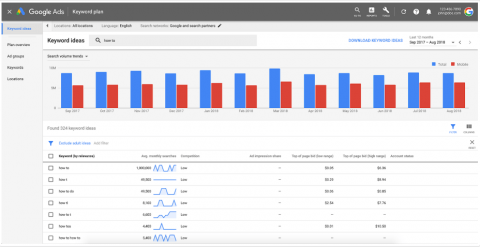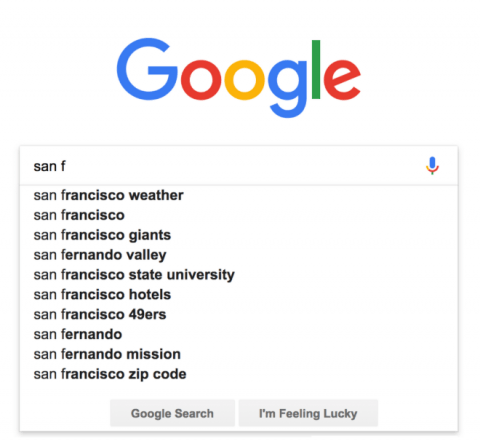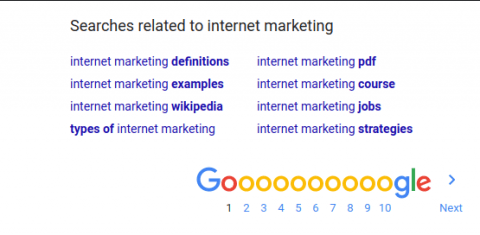Google Ads keywords – the key to a successful campaign!
An essential stage in the preparation of Google Ads campaigns is the selection of keywords. Choosing the best keywords to bid on that are most likely to result in clicks and conversions. Thanks to the right keywords placed in the Google Ads campaign, you will reach users interested in your products or service. In this article, you will learn about the types of keywords in Google Ads, how to promote your business on Google Ads effectively. You’ll also learn a set of methodologies to help you acquire, refine, and organise your PPC keywords, all in the service of better targeted and more effective pay-per-click campaigns.
The success of your Google Ads campaign depends on the right selection of keywords for your industry. When planning activities in the Search Network, you must first think about what queries in Google search engine potential customers are looking for to find your products or services. By taking care of the right selection of key phrases from the beginning of the campaign, you will generate more valuable traffic, and you can avoid accidental visits to the website and you will not waste the budget.
What is the keyword?
Keywords are search queries that searchers enter in Google Search Engine to find the information they want. When a customer searches for a search term that matches your keyword, your ad can enter the auction and will appear. The cost of a keyword depends on its quality, competition in the auction, and many other factors. Most importantly, keywords and landing page should be closely related to the customer’s search terms and the content of the websites he visits.
How do you choose Google Ads keywords?
Keywords segmentation.
At the very beginning of creating a list of keywords, you need to think about the campaign goal for your business. Google Ads keywords for the online store will be different than for the service company. First of all, you need to focus on ensuring that the anticipated queries entered by our potential customers coincide with the content on the page. It will make your campaign more valuable to the user in the long run, because Internet users entering a sponsored link from a given query in the search results will find the product or service they are looking for.
When creating a campaign, you must first consider the construction of your website to segment keywords by specific product and service categories properly. Competition analysis will also be helpful at this stage. It is worth looking at what phrases are displayed on other sites with a similar offer to yours. This will allow you to catch any errors on the site, and also expand your knowledge about communication with a potential customer in the industry.
Google Ads keyword matches types.
Unlike positioning the page in Google organic results, by creating a Google Ads campaign in the Search Network, you have the option of using key phrase matches. Depending on the broad range of potential customers you want to reach, you can use appropriate phrase matching.
Broad Match
Broad match is applied by default to your Google Ads campaign. If you don’t use additional characters in the list of keywords, they will be classified as broad-matched words. For example, if the client will enter the phrase wooden chair, you will also get a website visitor from the query buy a second hand wooden chair in north london. In general, I advise against using this match because you lose control over a large portion of website traffic and the number of unsuccessful entries will increase.
Broad Match Modified
You retain more control over website traffic by using this match. Keywords are modified by adding +. E.g. for the keyword + wooden +chair, the ads will appear after entering additional words in place of the pluses, for example, find a wooden chair, red wooden chair. In general, I think it is worth using the broad match modifier. While maintaining control over the traffic, you can analyse after which queries surfers look for your product or service, which in return will allow you to add new long-tail exact match keywords and exclude those that are not beneficial.
Phrase Match
Phrase match keywords are entered in quotation marks. The ads are displayed if a potential customer enters a similar word with a small modification. For example, after adding ‘wooden chair’, we get a page from the question wooden chairs.
Exact Match
This match will allow you to maintain full control over website traffic. They are added to the account with square brackets. For example, after entering the keyword [wooden chair], the ad will be displayed on the search query wooden chair only. You should use as many exact matches as possible. This will prevent you from wrong website traffic, and give you more budget for potential conversions.
Negative Keywords
A properly constructed Google Ads campaign should also include negative keywords that your ads won’t show on. First of all, you have to choose phrases that could present your company in a bad light, so you can exclude all profanity and negative epithets. Then, following the course of the campaign and the list of search terms, you should add to the exclusions the negative keywords, which in your opinion, are irrelevant to your product or service.
SKAGs – Single Keyword Ad Group
An effective Google Ads campaign in the Search Network should be constructed from the very beginning as precisely as possible for the targeting group. I suggest creating one ad group per keyword in up to two matches (preferably Exact Match and Broad Match Modifier). This will allow you to match the ad text precisely to the keyword, which will increase the CTRs. Thanks to this construction of the campaign, you will also maintain greater control over thread spend so that you won’t lose the budget for accidental clicks. Single Keyword Ad Group Campaign is even better and easier for optimisation.
Phrases that clients are using to find the services or products offered by the company are essential in running Google Ads campaigns. Where to look for them?
When completing the list of keywords, it is worth using tools supporting this process.
Keyword Planner
The first tool that comes to mind of anyone using the Google Ads will undoubtedly be the keyword planner. Thanks to this tool, you can not only find phrases related to your product or service, but you can also check their monthly number of searches (historical and forecast) as well as the estimated cost of clicking on the keyword after it is displayed.

Google Search Engine
The next place where you can find ideas for new keywords is the Google Search Engine. Already when entering the phrase, “san francisco” in the window appeared hints with its varieties and extended versions: “san francisco weather”, “san francisco giants”, which is already valuable information that allows you to exclude searches unrelated to your product or service.

Another place where you can find suggestions on the search results page is the end of the list on Google search page where similar searches are listed at the very bottom.

Google My Business
Once your business listing is published on Google My Business, you’ll be able to access valuable information, such as search terms, which users enter in the search engine so Google can display the company profile.
Google Ads Search Terms
If a Google Ads campaign is already running, the best place to search for key phrases is the Search terms list available in the Keywords tab in the Google Ads panel. You can browse for search terms from users who have clicked on ads in specific campaigns and ad groups. It is advisable to add those that relate to our offer to your campaign on an ongoing basis, while those that should not trigger your ad should be successively excluded.
Google Trends
If you want to check whether your product or service is seasonal, it is worth using Google Trends. The tool will show the popularity of the phrase in the selected period. Unfortunately, if the selected keyword has low searchability, you will not receive information about trends in search results.
Other Websites And Forums
Keywords for more complex and niche topics can also be found in the broadly understood network. What if you do not know what potential customers can use to find your product or service? Then it is worth looking through thematic forums or other websites devoted to similar topics from time to time to see the actual terms and names used by Internet users. It is worth using them both on the site and in the Google Ads campaign.
You can also use free websites that support keyword search.
Ubersuggest
This is a free and intuitive application that will help you find additional keywords. You will not receive information about the popularity of a given phrase, but you will learn what expressions are used by users.
Answer The Public
A popular and recommended tool. By using Answer The Public, you will receive a set of questions related to a given phrase, which users enter into search engines. You will get ready phrases that are inspiration and ideas for new keywords.
Summary
In some industries, finding the right keywords can be a challenge. Also, for people just starting their new business, the correct naming of the product and service offered can be a problem. You can search for keywords yourself using the tools indicated, but the start of Google Ads campaign should be preceded by a thorough marketing analysis and audit of the website. Without this, the keywords, selected for the campaign, may be completely different from what users will enter in the search engine while looking for the product or service that you want to offer them.
The effectiveness of reaching potential customers depends on well-conducted keyword analysis. Take a comprehensive approach and look at the service from different points of view: industry, competition, users. To find converting and searchable phrases, you have to use various tools. From the list of keywords use only those that most reflect the text on your page and those which are entered by a large group of Internet users in the search engine.
Quite often despite the experience and intuition when choosing a list of keywords for Google Ads campaigns, the keywords not always work as we think they will. The chosen keywords can be finally reviewed only after the statistics data that they obtain with the time. Sometimes, more general keywords generate more conversions than precise ones. Therefore, you should always follow, e.g. using Google Analytics, what the behaviour of users who enter the site after entering specific phrases looks like. If in the beginning, you thought that a keyword would generate sales due to its nature, and statistics show something else – you should give up this phrase.
The right selection of keywords for the campaign is possible only thanks to regular optimisation of the keyword list, using the collected data. Making the right and effective changes to a Google Ads campaign requires knowledge and experience, which is why it’s worth considering to hire a professional agency. At the same time, saving time and money spent on clicks – a professional company often achieves lower rates due to high-quality operations. If you want to know if your campaign can be run more effectively, write to us and we’ll do an audit of your Google Ads account and tell you if it can be managed and optimised better.


Leave a Reply